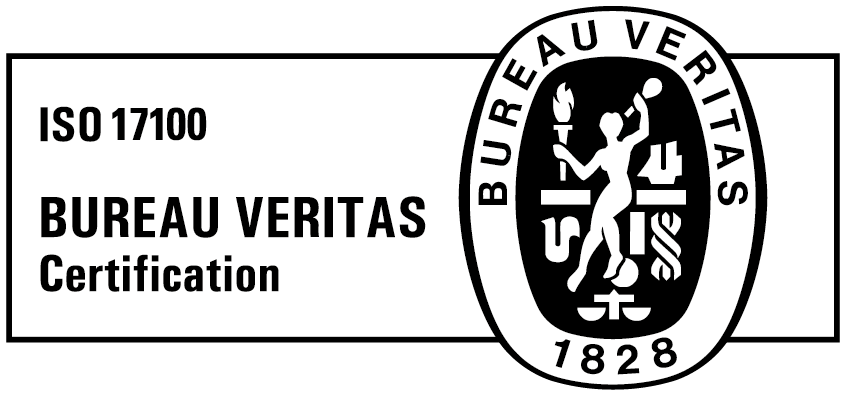Terms and Conditions


1 Preliminary Provisions
1.1 General Terms and Conditions of Business shall apply to all services provided by the TAIA Translations LTD, located at 71-75 Shelton Street, Covent Garden, London, WC2H 9JQ, (hereinafter referred to as “the contractor”) or to all legal relations between the contractor and the client, under all terms of business, unless the contractor and the client agree in writing to use different terms and conditions. The General Terms and Conditions form the basis for all contracts concluded between the contractor and the client.
1.2 When ordering through the TAIA platform, by email or telephone, the client is deemed to have read and fully agreed to these General Terms and Conditions.
1.3 Definitions
Translation and Revision (as a uniform procedure)
Translation is a bilingual process in which the meaning of the source text is transferred into a text in the target language. Each translation is also revised in accordance with ISO 17100. If the source file is submitted in a format other than text (image, pdf or similar), the client will always receive the translation in a text format – most often the Microsoft Office format.
Revision is a bilingual process in which the reviser (an experienced translator) revises the translation. A revised translation which has not been proofread may still contain minor stylistic or other minor errors.
Proofreading
Proofreading is a monolingual process in which the proofreader reads and corrects only the target language text. The proofreader corrects grammatical mistakes, improves the style and language quality. In a case where the contractor receives all detailed information (context, preffered terminlogogy and values), the proofread output will be without errors and in style that the buyer wishes.
Light Review
At a first glance, a light review is the same process as MT post-editing, only much faster. The light review process consists of correcting the most obvious Machine Translation errors at a higher speed. Because of lower quality of the text we do not take any responsibility for miss understanding of the translation with practical use.
DTP (desktop publishing)
DTP is a service in which the customer is guaranteed to receive the final document with the target text in the same format in which the source text was submitted. Where DTP is not ordered, the contractor is not obliged to submit the translation in the original form, but only in text.
Context
The translations are done to high translation standards and the text goes through the entire TAIA quality assurance process. Despite this, terminological deviations may appear due to your preferences and your chosen company terminology. It is therefore important that the client give clear instructions and guidelines upon ordering for the translators to follow and, after receiving the translation, publish the preferred terminology and other possible warnings, so that they can be included in your terminological database (Translation Memory and glossary). This will enable us to deliver the desired form in future translations.
2 Contractor, Client and Service
2.1 The contractor is TAIA Translations LTD, located at 71-75 Shelton Street, Covent Garden, London.
2.2 The client is a legal or natural person who orders the contractor’s services and to whom the contractor offers the services in its field.
2.3 The service can be a translation, proofreading, or graphic design service which is provided to the client by the contractor.
3 Quotation, Order, Change or Order Cancellation
3.1 In order to receive an informational quotation, the client must provide the contractor with all the necessary information, such as the type of service (translation, court translation, proofreading, correction, DTP, graphic design, localization), the material or text length, the source and target languages, the desired deadline for the completion of the service, contact details, as well as any other wishes and requirements.
3.2 An inquiry or the contractor’s informational quotation is not binding and does not constitute a confirmed order, since a written order confirmation is an essential condition for a valid order (an offical order is one made via email, the TAIA application (app.taia.io), a printed order form, or through the prepayment of the service carried out within the time limit and under the conditions specified in the quotation.
3.3 The contract between the contractor and the client is concluded when the contractor confirms the client’s order in writing by email or through the TAIA application.
3.4 Any modification or cancellation of the contract is acceptable only if the client undertakes to cover all costs incurred. All or part of the work performed shall be charged to the client in proportion to the costs incurred during the performance of the service.
4 Rights and Obligations of the Contractor and the Client
4.1 The contractor undertakes to perform all the ordered services to a high standard or to the best of their ability, knowledge, capacity and within the agreed delivery period in accordance with the client’s instructions.
4.2 The delivery period is set by the TAIA platform automatically. If the order is placed via email, the delivery period is confirmed by the project manager. The delivery period always begins with the submission of all necessary files and information for the execution of the project.
4.3 In the event that deadlines cannot be met, the contractor is obliged to notify the client immediately. In these circumstances, the client does not have the right to refuse the delivery of the translation, the performance of the service or to terminate the contract. In case of delay, the contractor may offer a discount to the client.
4.4 The translation shall be delivered to the client in one copy via the TAIA application or by email, on an electronic medium or in printed form. Unless otherwise agreed, the contractor shall deliver the translated material by email, except in the case of court translations, which shall be delivered via registered post by the Post of Slovenia.
4.5 The client is obliged to submit the original text in electronic form or in an editable format. Otherwise, the contractor is not responsible for the loss of the original form of the text after its translation.
4.6 The contractor guarantees the strictest protection of the client’s personal data, official and trade secrets contained in the originals, oral explanations and written translations provided and must not in any way disclose them to third parties or unauthorized persons. The contractor is allowed to provide its subcontractors (translators, proofreaders) only with the information required for their work.
4.7 If the text which is the subject of the contract contains unusual terms, unknown abbreviations, difficult technical vocabulary or already established terms to be followed by the contractor, the client undertakes, upon the contractor’s request, to appoint a contact person whom the contractor may contact for any needed explanations, to obtain a terminological dictionary or additional literature. If this is not possible, the contractor shall use the reference material available to it and translate the text to the best of its ability. If the client fails to fulfill this obligation, all complaints regarding the improper use of terminology shall be rejected.
4.8 Unless explicitly prohibited by the client, the contractor shall have the right to display the client’s name or logo in its references. The contractor shall protect all obtained information about the client in accordance with the Personal Data Protection Act and the Consumer Protection Act.
5 Prices, Discounts and Payment Terms
5.1 Services shall be billed in accordance with the contractor’s price list valid on the date of the conclusion of the contract or, in special cases, in accordance with the prices set by special written agreement with the client.
5.2 Prices are calculated per word and do not include VAT.
The minimum unit of account is one (1) standard translation page. The minimum order amount is € 15 excluding VAT.
5.3 As a rule, translation price is calculated based on the original text. If it is not possible to determine the price from the source text, the translation price is calculated from the target-language text.
5.4 Prices are estimates and may vary depending on the level of complexity of the text, which is determined upon review. For texts containing demanding terminology and for urgent translations delivered within a shorter period of time, the contractor shall, with the prior agreement of the client, charge an additional fee for complexity or urgency. For texts in paper or electronic form which do not allow OCR scanning or electronic copying of the text (inferior photocopies, handwriting, illegible scanned documents), we charge a 20 to 50% markup on the price.
5.5 The contractor may offer a periodic discount to regular customers in accordance with an agreement or a long-term cooperation contract.
5.6 In the case of emergency deadlines, the contractor may charge an additional fee for urgency ranging from 20% to 50%.
5.7 Legal entities shall pay for the service after the service has been provided on the basis of the issued invoice or in advance on the basis of the issued invoice. The payment deadline is indicated on the invoice.
5.8 Natural persons shall pay for the service before the performance of the contract. Translation or proofreading begins immediately after payment or after receiving the receipt of payment.
5.9 Payment is due eight days after the invoice is issued. For public service contracts or long business relationships (if agreed in writing by the parties), the payment deadline is thirty (30) days after the invoice is issued.
5.10 If there is doubt about the solvency of the client, larger orders, orders of foreign clients, at the first concluded transaction and in other cases where the contractor deems it necessary, the contractor shall have the right to request advance payment from the client. In case of late payments, the contractor reserves the right to charge late payment interest. If the client fails to settle its obligations within 8 days from receiving the reminder, the contractor may use all legal measures to recover the debt.
6 Complaints of demand for corrections
6.1 After the service has been provided, the client is obliged to review the delivered translation or proofreading and to submit any complaint in writing by email within eight (8) days from the day of delivery. The complaint must be clear and well-reasoned. For larger orders (more than 100 translated translation pages), the client is entitled to an extended complaint period lasting up to 30 days from the date the service was provided. If the client misses the legal deadline for filing a complaint, the contractor does not consider the complaint. One complaint per order is considered.
6.2 The complaint is unjustified if the client changes the material after the service has been provided. The contractor is not responsible for any errors that occur due to the client’s subsequent interference with the proofread, translated, graphically designed text. The complaint is also unjustified if the client wishes to lodge it for services that have not been ordered, as follows from the definitions of these general terms.
A complaint about the finished product by the client is only justified when the finished product does not match the order, as follows from the definitions of services in these general terms. In case of a justified complaint, the client undertakes to correct the errors as soon as possible in accordance with the order and these terms. Complaints that fall outside these definitions and the order will not be considered. A complaint is also not justified if the client has not provided sufficient information and instructions needed for the desired end result.
6.2. The complaint must contain the order details, explicit comments and clarified corrections concerning the translation, proofreading or graphic design. If the complaint does not contain the mentioned information, it will not be considered.
6.3 In the event of a justified objection (at the discretion and opinion of the translation service provider and an independent translator or proofreader), the customer shall be provided with an improved and completed product within the agreed deadline. In case of a justified complaint, the contractor may offer a discount to the client. The contractor does not accept invoice rejection but only the demand for corrections.
6.4 The complaint is unjustified if the client rejects the proposed proofreading when ordering a translation (as a rule, this applies to texts intended for public publication) and the complaint is made due to minor stylistic or spelling mistakes in the translation, which, in such cases, are primarily the responsibility of the proofreader. If the translated text is published or disseminated in any way and the client has not previously informed the contractor of such use of the text, and has not requested proofreading and corrections before the publication of the text, the client shall not have any rights to compensation for any errors in the text. The contractor does not guarantee the quality of the translation which is done at the express request of the client within an unreasonably short deadline.
7 Copyright
7.1 Until the service is fully paid for, all translated files are property of the contractor in accordance with the applicable intellectual property law. Upon payment of the invoice, all copyrights belong to the client who ordered the service. The contractor in no way assumes responsibility for the infringement of material copyright or moral copyright of third parties. Any use, partial or complete reproduction of the translation is unlawful unless the service has been paid for.
Accepted 1.8.2019
